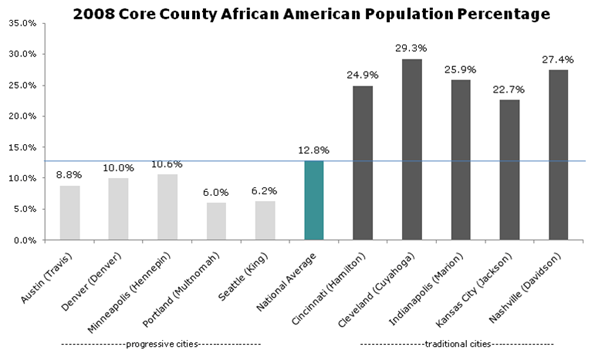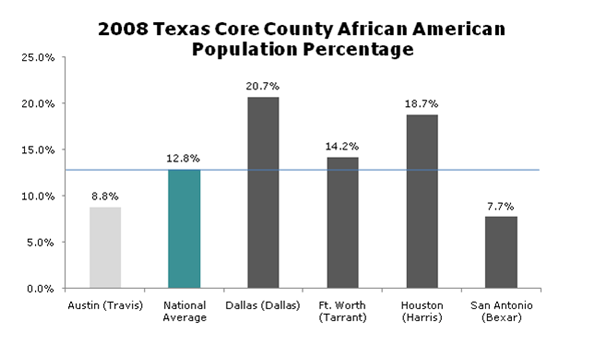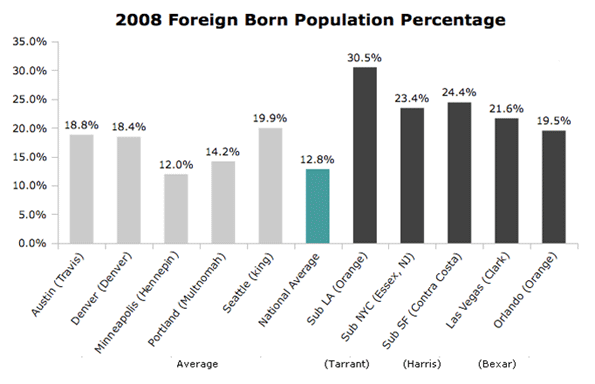
Among the media, academia and within planning circles, there’s a generally standing answer to the question of what cities are the best, the most progressive and best role models for small and mid-sized cities. The standard list includes Portland, Seattle, Austin, Minneapolis, and Denver. In particular, Portland is held up as a paradigm, with its urban growth boundary, extensive transit system, excellent cycling culture, and a pro-density policy. These cities are frequently contrasted with those of the Rust Belt and South, which are found wanting, often even by locals, as “cool” urban places.
But look closely at these exemplars and a curious fact emerges. If you take away the dominant Tier One cities like New York, Chicago and Los Angeles you will find that the “progressive” cities aren’t red or blue, but another color entirely: white.
In fact, not one of these “progressive” cities even reaches the national average for African American percentage population in its core county. Perhaps not progressiveness but whiteness is the defining characteristic of the group.

The progressive paragon of Portland is the whitest on the list, with an African American population less than half the national average. It is America's ultimate White City. The contrast with other, supposedly less advanced cities is stark.
It is not just a regional thing, either. Even look just within the state of Texas, where Austin is held up as a bastion of right thinking urbanism next to sprawlvilles like Dallas-Ft. Worth and Houston.

Again, we see that Austin is far whiter than either Dallas-Ft. Worth or Houston.
This raises troubling questions about these cities. Why is it that progressivism in smaller metros is so often associated with low numbers of African Americans? Can you have a progressive city properly so-called with only a disproportionate handful of African Americans in it? In addition, why has no one called these cities on it?
As the college educated flock to these progressive El Dorados, many factors are cited as reasons: transit systems, density, bike lanes, walkable communities, robust art and cultural scenes. But another way to look at it is simply as White Flight writ large. Why move to the suburbs of your stodgy Midwest city to escape African Americans and get criticized for it when you can move to Portland and actually be praised as progressive, urban and hip? Many of the policies of Portland are not that dissimilar from those of upscale suburbs in their effects. Urban growth boundaries and other mechanisms raise land prices and render housing less affordable exactly the same as large lot zoning and building codes that mandate brick and other expensive materials do. They both contribute to reducing housing affordability for historically disadvantaged communities. Just like the most exclusive suburbs.
This lack of racial diversity helps explain why urban boosters focus increasingly on international immigration as a diversity measure. Minneapolis, Portland and Austin do have more foreign born than African Americans, and do better than Rust Belt cities on that metric, but that's a low hurdle to jump. They lack the diversity of a Miami, Houston, Los Angeles or a host of other unheralded towns from the Texas border to Las Vegas and Orlando. They even have far fewer foreign born residents than many suburban counties of America's major cities.

The relative lack of diversity in places like Portland raises some tough questions the perennially PC urban boosters might not want to answer. For example, how can a city define itself as diverse or progressive while lacking in African Americans, the traditional sine qua non of diversity, and often in immigrants as well?
Imagine a large corporation with a workforce whose African American percentage far lagged its industry peers, sans any apparent concern, and without a credible action plan to remediate it. Would such a corporation be viewed as a progressive firm and employer? The answer is obvious. Yet the same situation in major cities yields a different answer. Curious.
In fact, lack of ethnic diversity may have much to do with what allows these places to be “progressive”. It's easy to have Scandinavian policies if you have Scandinavian demographics. Minneapolis-St. Paul, of course, is notable in its Scandinavian heritage; Seattle and Portland received much of their initial migrants from the northern tier of America, which has always been heavily Germanic and Scandinavian.
In comparison to the great cities of the Rust Belt, the Northeast, California and Texas, these cities have relatively homogenous populations. Lack of diversity in culture makes it far easier to implement “progressive” policies that cater to populations with similar values; much the same can be seen in such celebrated urban model cultures in the Netherlands and Scandinavia. Their relative wealth also leads to a natural adoption of the default strategy of the upscale suburb: the nicest stuff for the people with the most money. It is much more difficult when you have more racially and economically diverse populations with different needs, interests, and desires to reconcile.
In contrast, the starker part of racial history in America has been one of the defining elements of the history of the cities of the Northeast, Midwest, and South. Slavery and Jim Crow led to the Great Migration to the industrial North, which broke the old ethnic machine urban consensus there. Civil rights struggles, fair housing, affirmative action, school integration and busing, riots, red lining, block busting, public housing, the emergence of black political leaders – especially mayors – prompted white flight and the associated disinvestment, leading to the decline of urban schools and neighborhoods.
There's a long, depressing history here.
In Texas, California, and south Florida a somewhat similar, if less stark, pattern has occurred with largely Latino immigration. This can be seen in the evolution of Miami, Los Angeles, and increasingly Houston, San Antonio and Dallas. Just like African-Americans, Latino immigrants also are disproportionately poor and often have different site priorities and sensibilities than upscale whites.
This may explain why most of the smaller cities of the Midwest and South have not proven amenable to replicating the policies of Portland. Most Midwest advocates of, for example, rail transit, have tried to simply transplant the Portland solution to their city without thinking about the local context in terms of system goals and design, and how to sell it. Civic leaders in city after city duly make their pilgrimage to Denver or Portland to check out shiny new transit systems, but the resulting videos of smiling yuppies and happy hipsters are not likely to impress anyone over at the local NAACP or in the barrios.
We are seeing this script played out in Cincinnati presently, where an odd coalition of African Americans and anti-tax Republicans has formed to try to stop a streetcar system. Streetcar advocates imported Portland's solution and arguments to Cincinnati without thinking hard enough to make the case for how it would benefit the whole community.
That's not to let these other cities off the hook. Most of them have let their urban cores decay. Almost without exception, they have done nothing to engage with their African American populations. If people really believe what they say about diversity being a source of strength, why not act like it? I believe that cities that start taking their African American and other minority communities seriously, seeing them as a pillar of civic growth, will reap big dividends and distinguish themselves in the marketplace.
This trail has been blazed not by the “progressive” paragons but by places like Atlanta, Dallas and Houston. Atlanta, long known as one of America's premier African American cities, has boomed to become the capital of the New South. It should come as no surprise that good for African Americans has meant good for whites too. Similarly, Houston took in tens of thousands of mostly poor and overwhelmingly African American refugees from Hurricane Katrina. Houston, a booming metro and emerging world city, rolled out the welcome mat for them – and for Latinos, Asians and other newcomers. They see these people as possessing talent worth having.
This history and resulting political dynamic could not be more different from what happened in Portland and its “progressive” brethren. These cities have never been black, and may never be predominately Latino. Perhaps they cannot be blamed for this but they certainly should not be self-congratulatory about it or feel superior about the urban policies a lack of diversity has enabled.
Aaron M. Renn is an independent writer on urban affairs based in the Midwest. His writings appear at The Urbanophile.













Various educational tools,
Various educational tools, comics, children's book, newsletter, games were arranged in the lounge and freely available. Remember that complex issues (social, economic and environmental) are not the only case of experts, but everyone's business. Because all able to understand and act. trevo
This is a great opportunity
This is a great opportunity if you want to start a carrier in entertainment. It's a small step. But, big achievement comes from small steps you make. So don't be afraid to try. Who knows you will be success in the future, right? Birthday Invitations
It is important thing to us,
It is important thing to us, so don't lack of it. Recognize risk factors, screening and diagnostic tests to identify groups at risk. Apply the principles of epidemiological surveillance for the promotion, disease prevention and control in the field of professional practice. summer camps
In writing your online
In writing your online profile, stay away from generic adjectives and focus more on proper nouns and stories. If you're going to be wordy, have something interesting to say. Stay consistently positive and confident without seeming annoying and arrogant. Be proud of who you are and wear it confidently in your language and tone. Don't give anyone a reason to say no to you. Army Surplus
No wonder why the wise men
No wonder why the wise men say that all you do in a lifetime, you definitely have to do it with patience. Statistics underline this in a very precise manner. The affordability rate goes down in a direct proportion to the expansion of the economical crisis. Me and my husband, we have been renting in the white city for a few years now, until we barely managed to buy our own house. It has only been a year since we finally managed to arrange the house after our own tastes, decorating the backyard, repainting the walls in all rooms, changing the Bathroom Vanities and the livingroom furniture. Each and every house accomodation improvement came slowly afterward, one small investment at a time.
We must help our brother and
We must help our brother and sister in Haiti. They lost everything in that earthquake. It's our duty to help them. The earthquake in Haiti ruining everything. We can't fight the force of nature. All we have to do is try to help as much as we can. Searcholution
This reflects directly the
This reflects directly the data I saw recently in a presentation done by the HR services department at work. We're in Indianapolis, and it definitely seems right that though we're more "conservative" than many cities, we definitely have a higher African-American population -- greater diversity in general! It's a lot of fun to meet and learn from people who are not just the same middle class white as me. I think this helps make our city a first-class city.
Alhtough Sometimes Generalized, Your Blog Makes A Lot Of Sense
Many of the comments below seem to take the authors points personally and go out of there way to righteously disprove some well written points and thoughts. While there are some generalizations, the article is in line with the way I feel at times as a resident of Austin. I moved here for lifestyle, tech work, and the concept that I was moving to a place that was progressive in thought and action for my black children. Although there are some wonderful people here the label of "progressive and diverse" is not the first thing that always comes to mind. Secular and self-centered are sometimes more descriptive labels for this town. The city is very segregated and at times not very accepting of other cultures and races. None of the adverse comments in previous posts addressed how they or their cities engage or interact with their current black populations but continually ask "what is diversity" or why is it important or what is the criteria for diversity. The black population in Austin continues to get smaller every year as its black professionals and middle class move to other places where they feel accepted. The poor areas of town are neglected and simply avoided unless there is some trendy bar or nightclub. Most people don't care if the people in those areas prosper because it does not affect them at all or randomly affects them in a negative stereotypical sort of way. They sometimes fail to look beyond their own issues (which is very human) and say stupid comments like some of the comments in the previous post made by Sinecurious
To me not planning for a truly diverse, progressive and accepting society is kind of like civic planning. If you don't plan for a road system that will be able to accommodate a growing population you will eventually have traffic, congestion and jaded people who feel forced to move to the next safe suburb.
ah, white liberals
I don't know how I found this blog or this particular article, but I had to laugh. It deserves a good flaming, though I suspect that the author is probably a good fellow. I realize this post is now over a year old, but folks have commented quite recently.
I certainly agree that "progressive" cities "should not be self-congratulatory about it or feel superior about the urban policies a lack of diversity has enabled". Why is this? It's because most liberals are pathetic, lying hypocrites who refuse to speak the truth.
My initial "drunk guy at the bar" response: What is it with (white progressive) people? "elle" from Brooklyn pretty much nailed it. How large, exactly, is the bubble that you people live in? About as large as Oregon, apparently.
Why is it so lamentable that there are places where "diversity" is so lacking? Has the author ever lived in an area with a large black population? Has he ever even lived on the fringes of a black neighborhood? Has he ever had to "Deal" with that kind of crap, ever? Was the author ever the only white person on the school bus, classroom, etc.? Has he ever been stabbed in the leg with a pencil (punched, spit on, verbally abused, etc.)...for being the only white person in the classroom?
Be careful what you wish for, is all I can say.
I live in fairly blighted, impoverished city in Upstate, New York which is about 12% black. The town is largely segregated, but there are neighborhoods that are "mixed". I probably live in the whitest part of town. I am not a townie; I have lived in the urban yuppie places.
I would challenge anyone to break down the violent crimes committed in most any US city on the basis of race only. Stranger-upon-stranger violent crime (armed mugging and/or aggravated assault) is the clincher, since it's what makes people move away. That's what people generally mean when they say, "that's a bad area". Most people can deal with blight, junkies, and hookers, but not many people like it when someone sticks a gun in their face and says, "give it up, motherf*&cker!". That's no fun. Do you have lots of that in Portland? Davis Square in Somerville, MA? Austin? etc. etc.
There is absolutely no excuse for armed mugging or unprovoked physical assault, even if you are poor and cannot find work. Be thankful that there are large cities in the United States where that kind of thing is relatively rare.
The author should refer to the Unabomber Manifesto. Here is a snippet from paragraph #29:
In all ESSENTIAL respects more leftists of the oversocialized type want to make the black man conform to white, middle-class ideals. They want to make him study technical subjects, become an executive or a scientist, spend his life climbing the status ladder to prove that black people are as good as white.
-----
Why cannot you just accept that most African-Americans probably don't want to be around you (white progressives or whites in general)? They probably don't want to "enjoy" the things that white progressives find interesting, either. They don't want to listen to Stereolab or "This American Life", nor do they give a damn about whatever dumb fad is passing about through the white, liberal web/media Zeitgeist.
Why don't you just relax and stop worrying about "diversity"? Diversity is bullsh&t newspeak. Get over yourself.
If it really bothers you that much, you can always move to a more "diverse" area. Be a trendsetter, man!
Facts are Wrong
Thanks for the article, I appreciate your raising some interesting points, but essentially, most of your argument of "Whiteness" is incorrect. You can't measure whiteness by comparing % of black population. You realize that are many other races? I think your points are still somewhat valid from a 'class' discussion, but not a racial one.
So I pulled some data from the American Community Survey 2009 (Census data), and although they don't classify Hispanic in the same way as other races, I'm just using their percentages anyway (I feel it's a fair comparison if you're applying it the same in all metros). This also doesn't take into account all the races that do not fit into Hispanic, Asian, or African American (Native American, Islander, etc). It's just an approximation, but closer than yours.
What follows is an actual measure of whiteness:
Austin MSA is 31% Hispanic, 5% Asian, and 8% African American, leaving the city 56% white.
Minneapolis-St. Paul MSA is 5% Hispanic, 6% Asian, and 8% African American, leaving the city 81% white.
Portland MSA is 11% Hispanic, 7% Asian, and 4% African American, leaving the city 78% white.
Cincinnati MSA is 2% Hispanic, 2% Asian, and 13% African American, leaving the city 83% white.
To review:
Austin - 56% White
Portland - 78% White
MSP - 81% White
Cincinnati - 83% White
So, Cincinnati is the whitest of these 4 cities. Yes, this is metropolitan areas, not JUST the primary cities, but anybody talking about cities today realizes that the borders don't end at the traditional city boundaries, and an analysis that doesn't look at metros is pretty bogus.
What this DOES potentially show is some really interesting dynamics, where the so-called "progressive" cities that you're discussing, while less white than rust-belt cities, might have a higher concentration of white (or more realistically, better educated/higher income) people in the urban core.
Whereas in the older, rust-belt cities that suffered through white flight for years, the poorer/minority population is concentrated in the urban core, with the wealthier (and generally whiter) population lying in the suburbs.
So, there's certainly a lot to talk about, but The White City is clearly not an apt description.